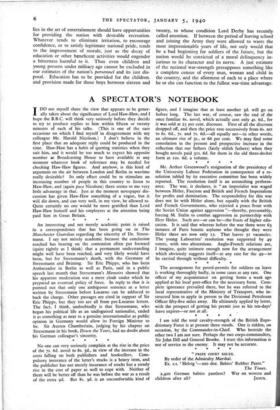An interesting and not merely academic point is raised in
a correspondence that has been going on in The Manchester Guardian regarding the sincerity of Dr. Strese- mann. I say not merely academic because the conclusion reached has bearing on the contention often put forward (quite rightly as I think) that a permanent understanding might well have been reached, and very likely would have been, but for Stresemann's death, with the Germany of Stresemann and Bruning. Sir Eric Phipps, who has been Ambassador in Berlin as well as Paris, said in a public speech last month that Stresemann's Memoirs showed that his apparent moderation was a mere cloak under which he prepared an eventual policy of force. In reply to that it is pointed out that only one ambiguous sentence in a letter written by Stresemann before Locarno can be adduced to back the charge. Other passages are cited in support of Sir Eric Phipps, but they too are all from pre-Locarno letters. The fact, I think, undoubtedly is that Stresemann, who began his political life as an undisguised nationalist, ended it as something as near to a genuine internationalist as public opinion in Germany would allow its Foreign Minister to be. Sir Austen Chamberlain, judging by his chapter on Stresemann in his book, Down the Years, had no doubt about his German colleague's sincerity.
* * * *


































 Previous page
Previous page